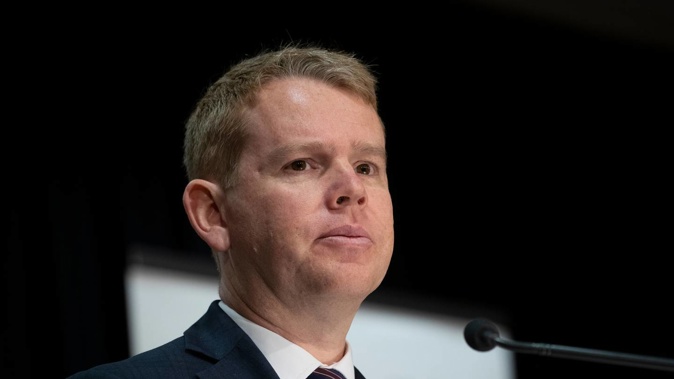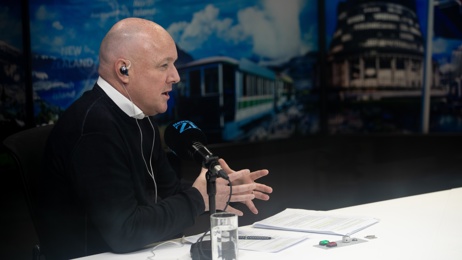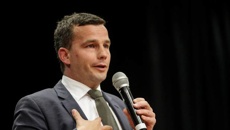
Prime Minister Chris Hipkins says Te Whatu Ora’s publishing of incorrect emergency department wait time data is “unacceptable”, but maintains mistakes do happen.
Hipkins is joining Newstalk ZB’s Kerre Woodham at 10am today for a one-hour session, including taking listeners’ questions. You can watch the livestream here.
Today’s interview follows good news for Labour and Hipkins in the latest political poll. The party has taken the lead in the Taxpayers’ Union-Curia poll for the first time since March 2022, hitting 35.5 per cent - a rise of 1.1 points on last month’s poll.
But the lead is wafer-thin, National is on 34.8 per cent, up 0.4 points. Thanks to Act’s support, National would still be in government on this poll.
The minor parties are being squeezed: Act is on 9.3 per cent, a fall of 2.4 points, while the Greens hover close to the 5 per cent threshold, falling 2.1 points to 5.7 per cent.
If the Greens fell below 5 per cent, they would need Chlöe Swarbrick to retain her seat of Auckland Central to stay in Parliament.
Of the smaller parties, NZ First polled 4.2 per cent, New Conservatives 2.5 per cent, Top polled 1.7 per cent, and the Māori Party polled 1.4 per cent.
Translated into seats, Labour is up three seats on last month’s poll to 49, while National is up two seats to 48. Act is down two seats to 13 and the Greens are also down two seats to eight. The Māori Party is down one seat to two.
National leader Christopher Luxon continues to be outgunned in the popularity stakes. His net favourability has increased by 3 points from -5 per cent to -2 per cent.
That compares to Hipkins’ favourability of +33 per cent, up 6 points. Hipkins even has net favourability among National voters.
“My feet have barely hit the ground”, Hipkins tells Woodham about how it’s been going as Prime Minister since Jacinda Ardern resigned earlier this year.
On education, Hipkins said school attendance had trended down since 2015 but was severely impacted by Covid-19 in from 2020.
He was slightly critical of more recent actions of the Ministry of Education, saying it was “probably over-cautious” in its reluctance in allowing children to return to school after Cyclone Gabrielle.
/cloudfront-ap-southeast-2.images.arcpublishing.com/nzme/X7OYNI2UFZAS5F4MIOTPWRAMRU.jpg)
Prime Minister Chris Hipkins on the ground in Hawke's Bay after Cyclone Gabrielle. Photo / Warren Buckland
Hipkins restated his support for merging New Zealand’s 16 polytechnics into a single entity.
There had been about 8000 teachers joining the industry in the 18 months, something Hipkins believed was a good level of recruitment in an “incredibly competitive market” globally.
Asked how the Government could retain young people in the country, Hipkins identified wage growth as a vital factor.
“New Zealand’s wage growth needs to be more competitive ... we’re dealing with a skilled labour shortage right across the world.
“That necessity to grow our own more, invest more in upskilling, that has never been more essential.”
He said he wasn’t opposed to bringing in overseas workers but didn’t think “throwing open the borders” and letting lots of people in would solve the current labour issues.
Woodham confessed the one time she “really, really disliked” Hipkins was when he admitted Auckland was in Covid lockdown for too long.
Asked about the health system, Hipkins said emergency department wait times were exacerbated by the lack of after-hours options, like in Hipkins’ area of the Hutt Valley.
He said too many people were showing up to EDs with preventable ailments but things that should be dealt with by GPs.
“There’s no question, our health workforce is under pressure.”
/cloudfront-ap-southeast-2.images.arcpublishing.com/nzme/NNCLJVIADZDQNGJ6RMJMWT2KIM.jpg)
Health Minister Ayesha Verrall has come under pressure after Te Whatu Ora published incorrect ED wait time data. Photo / Jed Bradley
Hipkins said one of the challenges he’s always felt was the public’s need for answers while working with imperfect information.
“You’re not always working on perfect information.”
He referenced how when Covid-19 outbreaks occurred, people would demand to know whether rumours they’d heard were true but the Government was unable to confirm them.
On Te Whatu Ora’s publishing of incorrect ED wait time data, Hipkins said that was unacceptable.
“Clearly they put some data up that was incorrect and that’s unacceptable, that will happen from time to time.”
He also accepted he’d said the wrong figure with respect to ram raids but defended the Government’s record by highlighting ram raids had been consistently trending down.
Taking a question from a Gisborne resident about the Government allowing extensive tree planting, Hipkins said there should be more discussions about land-use.
“There’s an active debate around that and there’s probably more we need to do in that area.”
Hipkins emphasised the importance of getting inflation under control, saying it was “still hurting people” while acknowledging its global impact.
On housing and anti-social tenants, Hipkins said it wasn’t appropriate to simply boot people out because it created further problems.
“Kainga Ora has always been that housing provider of last resort and it will continue to be if we don’t want people out on the street and causing more problems there.”
Hipkins said it was a difficult matter because every case was different. Sometimes situations could be resolved either through police or shifting them to other accommodation.
Take your Radio, Podcasts and Music with you









